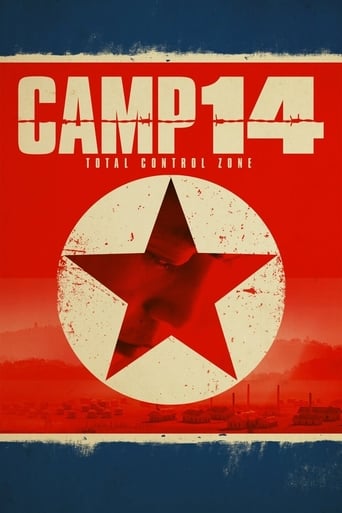tjwhale
I want to review this film in two halves.The story is just incredible, so powerful and moving, it's so hard to believe these places exist.Shin obviously struggles with recalling his past and it is important to hear what he has to say.So that part of it is good.However I think the film as a film is pretty bad.All of the information is much too spaced out, there are long pauses between every statement. Some of the movie has a voice over translation and some of it has subtitles which is a bit disorientating.And in the last 10 minutes Shin makes some statements which are startling and shocking and really change the interpretation of the whole of the rest of the movie.Which is very badly handled as really, in my opinion, those statements should have come half way through the movie and there should have been an extended investigation into them.The film maker is handed a unique opportunity to talk to one of the most interesting people on the planet and really bungles it, not getting into the depths of the issue, just telling the story as is.Though there is a power in that. The story speaks for itself with such intensity it is worth watching just for that.
Goloh
No rational person can doubt the ferocity of life in DPRK. Nobody is safe, and I don't doubt at all the basic truths of this film. But I have one question, maybe I just missed the explanation but in a country where there is no individualism and everyone spies on everyone else--which we assume to be the case--how could a 14-year-old boy, after escaping from a labour camp like this, just turn up in a nearby village and hang out there with no money, no work, no relatives, no friends, and more importantly no contacts to shield him from local police or camp guards who knew he escaped and must have been looking for him? The film did say the frozen river made it easier then to cross into China, but he had no prior knowledge of the outside world apart from what he was told by his cellmate? It could not have been as "easy" as the film made it sound, given the circumstances of the escape and even the time of year when it would have been very cold.On other points, the interlude among the group preparing for a road trip in support of Free DPRK was jarring in that it didn't lighten the mood, it just seemed out of place. And the chain-smoking ex-guard was pure evil, far more than any fictional character.
TheExpatriate700
Camp 14: Total Control Zone is a genuinely disturbing documentary about a young man who escaped from a North Korean prison camp where he had lived since birth. It paints a genuinely horrifying portrait of a totalitarian regime and its capacity to dehumanize its subjects.The film's main narrative focuses on the experiences of a man who was born to North Korean prisoners and spent his entire childhood in the prison camp. He relates experiences such as his first memory-an execution-daily life within the camp, informing on people, and being tortured by the camp guards. His story is supplemented with footage smuggled out of North Korea and former camp guards who defected to the South.Camp 14 is at its best when it relates the psychological effects on the inmates, particularly those born there. However, the interviews with the guards could have benefited from more background, particularly their reasons for defecting. Furthermore, no source or explanation is given for the footage from North Korea, leading to questions regarding its veracity.
carlvdl
Camp 14: Total Control Zone documents the harrowing details of 'life' in North Korea's forced labour camps from 3 perspectives, a former inmate born within one of the camps who managed to escape, a former guard, and a former member of the secret police.I do not want to give the story away for those who have yet to see it, but what these stories reveal is a world where a level of cruelty and disregard for human life exists that struggles to be dreamt up in infamous works of fiction by Pasolini or de Sade (some details a chilling reminder of scenes from 1975's 'Salo').The police and guards, who are the purveyors of this cruelty (and there must be a lot of them given the claimed 200,000 interned) can't all statistically be psychopaths. Operating under a ruthless system, they'd doubtlessly be users of the Nuremberg Defence.We read about the actions of the psychopath serial killer, which are a conundrum in themselves, but when this sort of behaviour manifests itself across a whole society, it becomes ... well, I can't find the right word.What sort of fear and desperation would lead to a society being created based on force feeding the populace lies and leader worship, ignorance replacing civic dialogue, with forced labour, torture and death being the only solution to needing a justice system (and for that matter, unemployment)? Only through a miraculous if not morbid event does the protagonist (Shin Dong-Hyuk) manage to escape the camp, and we are thankful he does, in order to experience freedom and provide the rest of the world with a brief but revealing peek into the horror show.Some of his revelations will prompt the viewer question the nature of human instincts. Seemingly we are born with no emotional attachment to our family or fellow human beings, only the will to survive appears to be firmly ingrained in us.As Camp 14 draws to a close, we get a sense of ennui and confusion from Shin at his new surroundings. He appears far from joyful at having left the life he was born into, inexplicable to the rest of us, as inexplicable and impenetrable as the conditions in which he was born into.

